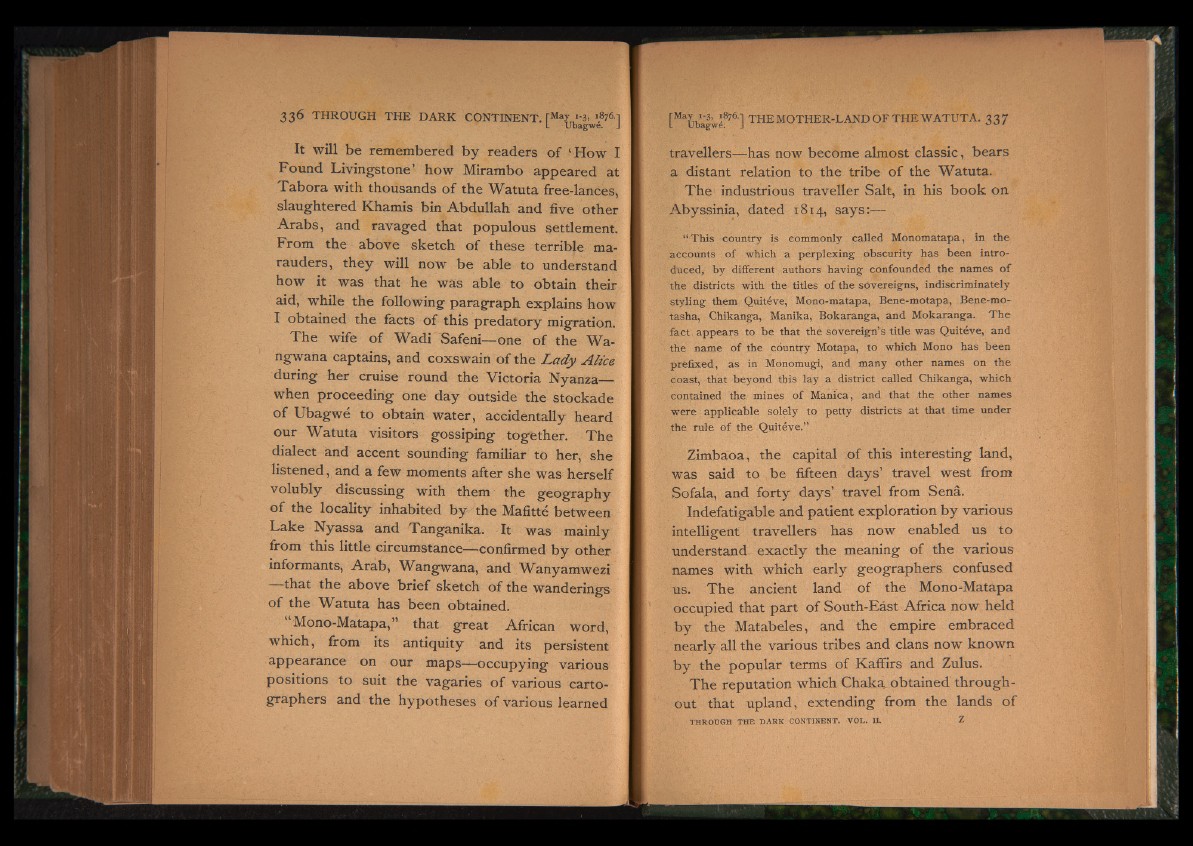
It will be remembered b y readers o f ‘How I
Found Livingstone’ how Mirambo appeared at
Tabora with thousands o f the Watuta free-lances,
slaughtered Khamis bin Abdullah and five other
A rab s , and ravaged that populous settlement.
From the above sketch o f these terrible marauders,
they will now be able to understand
how it was that he was able to obtain their
aid, while the following paragraph explains how
I obtained the facts o f this predatory migration.
T h e wife o f Wadi Safeni— one o f the Wa-
ngwana captains, and coxswain o f the Lady A lice
during her cruise round the Victoria Nyanza—
when proceeding one d ay outside the stockade
o f Ubagwé to obtain water, accidentally heard
our Watuta visitors gossiping together. The
dialect and accent sounding familiar to her, she
listened, and a few moments after she was herself
volubly discussing with them the geography
o f the locality inhabited b y the Mafitté between
L a k e Nyassa and Tanganika. It was mainly
from this little circumstance— confirmed b y other
informants, Arab, Wangwana, and Wanyamwezi
— that the above brief sketch o f the wanderings
o f the Watuta has been obtained.
Mono-Matapa,” that great African word,
which, from its antiquity and its persistent
appearance on our maps— occupying various
positions to suit the vagaries o f various cartographers
and the hypotheses o f various learned
travellers— has now become almost classic, bears
a distant relation to the tribe o f the Watuta.
The industrious traveller Salt, in his b o o k on
Abyssinia, dated 1814, says:—
“ This country is commonly called Monomatapa, in the
accounts of which a perplexing obscurity has been introduced,
by different authors having confounded the names of
the districts with the titles of the sovereigns, indiscriminately
styling them. Quiteve, Mono-matapa, Bene-motapa, Bene-mo-
tasha, Chikanga, Manika, Bokaranga, and Mokaranga. The
fact, appears to be that the sovereign’s title was Quiteve, and
the name of the country Motapa, to which Mono has been
prefixed, as in Monomugi, and many other names on the
Coast, that beyond this lay a district called Chikanga, which
contained the mines of Manica, and that the other names
were applicable solely to petty districts at that time under
the rule of the Quiteve.”
Zimbaoa, the capital o f this interesting land,
was said to be fifteen d ays’ travel west from
Sofala, and forty days’ travel from Sena.
Indefatigable and patient exploration b y various
intelligent travellers has now enabled us to
understand ex ac tly the meaning o f the various
names with which early geographers confused
us. The ancient land of the Mono-Matapa
occupied that part o f South-East Africa now held
b y the Matabeles, and the empire embraced
nearly all the various tribes and clans now known
b y the popular terms of Kaffirs and Zulus.
The reputation which Chaka, obtained throughout
that upland, extending from the lands o f
THROUGH THE DARK CONTINENT. VOL. II. Z